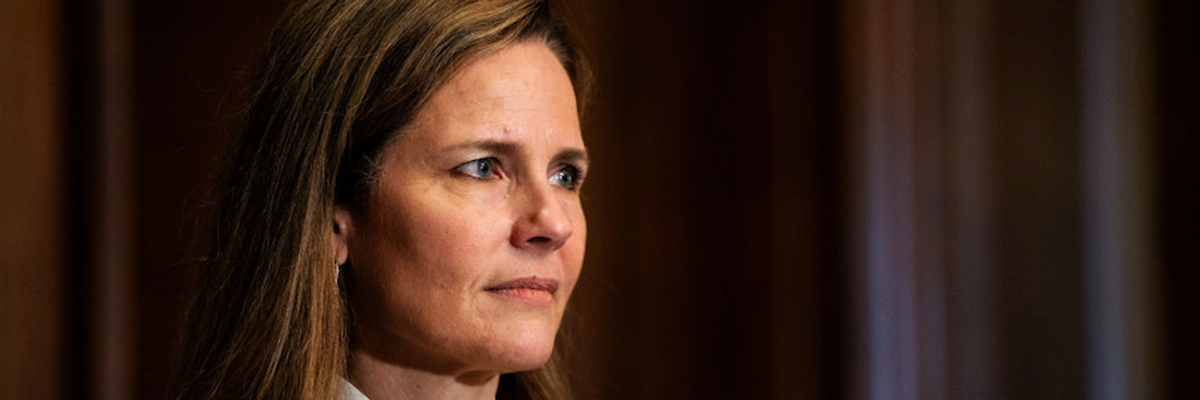This week, President Trump's highly controversial pick for the Supreme Court, Amy Coney Barrett, answers questions in front of the Senate Judiciary committee as part of her nomination hearings for the top legal job.
Coney Barrett's nomination to the vacant seat on the Supreme court vacated by the death Ruth Bader Ginsburg has prompted concern from experts and activists working on a plethora of issues, from abortion, the Affordable Care Act, climate change, and wider environmental policy to which her appointment would spell disaster.
If she is confirmed, which appears likely, she will tip the Supreme Court to a 6-3 conservative majority. Barrett's mentor was the arch conservative Antonin Scalia, who was similarly idolized by President Donald Trump.
"Barrett's conservative legal views and her closeness to her former boss and mentor, the conservative icon Justice Antonin Scalia, have raised concerns that she will push the court further to the right in ways that could be difficult to reverse for years or even decades," noted the Washington Post last month.
If confirmed, Barrett, who is 48 years old, would be the youngest Justice on the Supreme Court, who could shape a generation of American law.
Although her environmental record is sparse, there are deep alarm bells ringing.
An article in Slate magazine noted last month, that "Barrett and her conservative colleagues would also take a machete to the thicket of laws that protect the health and safety of millions of Americans," including limiting pollution, monitoring Wall Street, and protecting consumers from predatory practices.
Our colleagues at Earthjustice have been fighting in the courts on behalf of our planet and its people for decades. They have expressed "deep concerned that the rush to confirm Amy Coney Barrett could threaten our shared future."
Earthjustice also argues that "Judge Barrett appears willing to undermine our environmental laws" and that her "record demonstrates her willingness to interpret environmental laws like the Clean Water Act narrowly in favor of industry interests."
Finally, they say that "Amy Coney Barrett's record suggests that she may be willing to strip government agencies of the power to protect the environment and to further close the courthouse doors to those seeking justice."
And justice may be denied on what, to many, is the biggest issue of them all: climate change. Yesterday, Barrett was asked about her views on climate change and took the skeptical line that she could not comment because she was not a scientist.
This is a deeply worrying sign. Many climate fights in the U.S. right now, focused on trying to hold the government and companies accountable, could end up in the Supreme Court.
Salon argues her appointment might "tip the scales of justice rightward, opening up a Pandora's box of climate hostility."
They are not the only ones concerned. "Barrett's confirmation would be a catastrophe for the climate," argues Slate magazine. "She may well overrule the landmark 5-4 2006 EPA emissions reporting decision, long despised by conservatives, that compels the federal government to regulate carbon emissions."
And even "if Congress passes new legislation to curb greenhouse gas emissions, the court's conservative supermajority may strike it down, much as the Republican-appointed justices blocked the Clean Power Plan in 2016," argues Slate.
One of the landmark legal cases that could be affected is Juliana v. U.S., the lawsuit brought by 21 youth plaintiffs against the U.S. government in 2015 for taking insufficient action on climate change. As an article in Earther, "Barrett's approach to constitutional law doesn't necessarily look like a promising source of support for the youth plaintiffs."
Legal experts are worried too. Harvard law professor and former Obama administration official Jody Freeman told NPR Radio that with the appointment of Barrett, "it's going to be a corporate court, good for business, good for corporations."
And that can only be bad for climate, and bad for all of us. EarthJustice argues that "we need Justices who recognize the government's obligation to protect the environment and public lands for all people and who know the difference between science and politics." And by all accounts that person is not Amy Coney Barrett.




